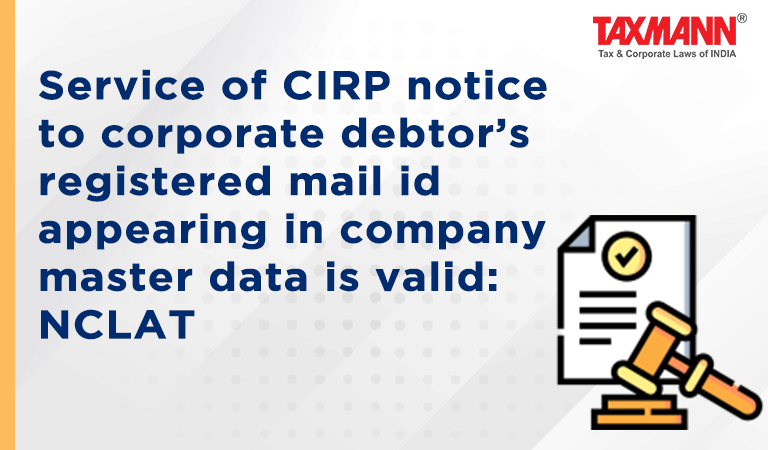Service of CIRP notice to corporate debtor’s registered mail id appearing in company master data is valid: NCLAT
- News|Blog|Insolvency and Bankruptcy Code|
- 3 Min Read
- By Taxmann
- |
- Last Updated on 24 February, 2022

Case Details: Rajnish Gupta Vs. Union Bank of India - [2022] 135 taxmann.com 284 (NCL-AT)
Judiciary and Counsel Details
-
- M. Venugopal, Judicial Member and Ms. Shreesha Merla, Technical Member
- Mohit Chaudhary, Kunal Sachdeva and Paras Mithal, Advs. for the Appellant.
- Ms. Ekta Chaudhury, Prateek Kushwaha and Abhishek Anand, Advs. for the Respondent.
Facts of the Case
In the instant case, the appellant challenged the admission of the CIRP plea filed under section 7 of the IBC by the NCLT. The appellant argued that the impugned order was passed ex-parte without issuing a notice and without providing an opportunity of being heard to the corporate debtor. He further submitted that notice was served to the personal mail Id of the director and due to inter se dispute between the directors, the said director failed to inform others of the notice serviced over email
The Learned Counsel for the Respondent submitted that ‘Service’ made was by way of an email which is the registered Email of the Company on the ‘Company Master Data’ on the MCA portal. An email was also sent to the Email ID of the Appellant herein who is also a Director of the Company.
He further stated that a WhatsApp message was also served to the appellant. A copy of the Section 7 Application was served to inform the Appellant of the pending litigation vide an email and hence it cannot be said that the ‘Appellant’ was not served in accordance with the law.
The appellant raised another question that the Respondent should withdraw its order as filed under section 7 of the IBC, 2016 as the Corporate Debtor was merely a guarantor no insolvency proceeding can be initiated against the Corporate Debtor being the Guarantor.
The NCLAT observed that the contention of the Learned Counsel for the Appellant that the service was effected to the personal Email ID of the Director and on account of inter se disputes between the parties, the said email was never informed to the other Directors, is untenable, in the light of the view of the fact that the material on record shows that an email was also sent to another Director together with the Copy of the Petition by WhatsApp.
Further, a perusal of the Company Master Data shows that the Respondent had served on the registered Email ID appearing on the Company Master Data and hence, we are of the considered view that the service by Email on the registered Email ID and also on the Email ID of the Appellant herein is held sufficient in the eyes of law.
NCLT Held
NCLT held that it did not find any illegality in the observations of the Adjudicating Authority in setting the ‘Appellant’ Ex-parte on account of non-appearance on which date it was set Ex-parte.
The Appellate Tribunal further observed that the ‘Guarantee Agreement’ executed between the parties was clear with respect to the liability of the Appellant herein. It clearly reflected that the Guarantor/Appellant was the Principal Debtor jointly with the Borrower.
“Section 128 of the Indian Contract Act, 1872, the liability of ‘Surety’ towards a ‘Creditor’ is coextensive with that of the ‘Principal Debtor’. When a default is committed, the ‘Principal Borrower’ and the surety are jointly and severally liable to the creditor, and the creditor has a right to recover his dues from either of them or from both of them simultaneously.“
Tribunal opined that the ‘Lender’ had independent access to the ‘Guarantor’ issued by the ‘Principal Borrowers’. Therefore, withdrawal of Section 7 Petition filed under the IBC Code, 2016 against the ‘Principal Borrower’ is not a fetter in initiating ‘CIRP’ against the ‘Guarantor’ in accordance with Law.
The Appellate Tribunal held that mere withdrawal of the ‘CIRP’ against the ‘Principal Borrower’ will not be a bar for the Respondent/Lender in initiating fresh ‘CIRP’ against the ‘Guarantor’.
Disclaimer: The content/information published on the website is only for general information of the user and shall not be construed as legal advice. While the Taxmann has exercised reasonable efforts to ensure the veracity of information/content published, Taxmann shall be under no liability in any manner whatsoever for incorrect information, if any.

Taxmann Publications has a dedicated in-house Research & Editorial Team. This team consists of a team of Chartered Accountants, Company Secretaries, and Lawyers. This team works under the guidance and supervision of editor-in-chief Mr Rakesh Bhargava.
The Research and Editorial Team is responsible for developing reliable and accurate content for the readers. The team follows the six-sigma approach to achieve the benchmark of zero error in its publications and research platforms. The team ensures that the following publication guidelines are thoroughly followed while developing the content:
- The statutory material is obtained only from the authorized and reliable sources
- All the latest developments in the judicial and legislative fields are covered
- Prepare the analytical write-ups on current, controversial, and important issues to help the readers to understand the concept and its implications
- Every content published by Taxmann is complete, accurate and lucid
- All evidence-based statements are supported with proper reference to Section, Circular No., Notification No. or citations
- The golden rules of grammar, style and consistency are thoroughly followed
- Font and size that’s easy to read and remain consistent across all imprint and digital publications are applied



 CA | CS | CMA
CA | CS | CMA
